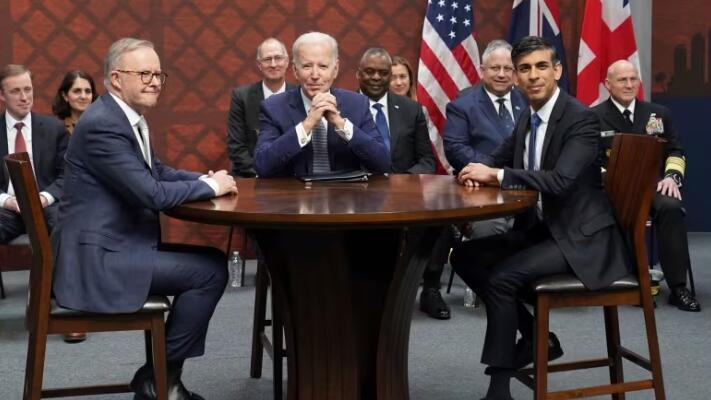Canada on sidelines as U.S., Britain, Australia move ahead on new security deal

Trudeau has refused to say whether Canada was invited to join AUKUS
Experts are warning that, as the U.S., Britain and Australia move ahead on an expanded military pact, Canada’s omission from that group suggests a larger problem with how this country is perceived by its friends.
U.S. President Joe Biden, British Prime Minister Rishi Sunak and Australian leader Anthony Albanese were at a naval base in San Diego on Monday to confirm the next steps of the trilateral agreement, known as “AUKUS” after the three countries involved.
Those next steps include formalizing American and British plans to help Australia develop a fleet of nuclear-powered submarines in response to growing concerns about China’s actions in the Indo-Pacific region.
- Senior military leader concerned by Canada’s absence from American-British-Australian security pact
The Trudeau government has downplayed the importance of AUKUS to Canada, saying Ottawa is not in the market for nuclear-powered submarines — even as others have lamented its absence from the pact.
One senior Canadian Armed Forces commander, Vice-Admiral Bob Auchterlonie, told The Canadian Press he worries about Canada not having access to the same cutting-edge technology as three of its closest allies.
Canada’s exclusion is seen by some as further evidence that its allies do not believe Ottawa is serious about pushing back against Chinese ambitions, despite the release of a new Indo-Pacific strategy late last year.
“Because of the pace of events that are unfolding in the Indo-Pacific area, our partners are moving on with essentially a clear direction in mind,” said Canadian Forces College professor Paul Mitchell, an expert on naval strategy and U.S. defence policy.
“Whereas Canada, it’s issued its Indo-Pacific strategy. But I think the trouble that the country has right now is that while it has a strategy, it really hasn’t decided what it wants to accomplish in the Indo-Pacific area.”
Canada’s strategy seeks to strike a balance between confronting and co-operating with China. It says Canada will challenge China “in areas of profound disagreement” while working together on areas of shared interest, such as climate change.
The U.S. is taking a very different approach. In a defence strategy released earlier this month, U.S. Defense Secretary Lloyd Austin described “an increasingly aggressive China” as a “generational challenge” and the American military’s top priority.
“What are we trying to accomplish here?” Mitchell said. “That’s the thing that really mystifies a lot of people. With the United States, there’s clearly an end there in terms of backing up its regional hegemony in the area and support to rules-based order.”
-
ANALYSIS
Experts call for an overhaul of Canada’s national security policy to cope with an ‘angry’ world
Former Canadian ambassador to China David Mulroney credited Australia with having initiated AUKUS after serious consideration of its future as a middle power in a world — and region — that China is seeking to dominate.
This reflects Australia’s more realistic and innovative approach to diplomacy, Mulroney said, adding it’s also the product of Canberra’s willingness to invest the necessary resources in making such a partnership become reality.
Numbers remain uncertain, but Australia reportedly is poised to spend billions of dollars as part of the deal to purchase new submarines. Britain and the U.S. are also expected to put money into the agreement for technology development, training and other areas.
Defence analyst David Perry of the Canadian Global Affairs Institute noted the U.S., Britain and Australia are all spending two per cent or more of their national gross domestic product on defence, compared to less than 1.3 per cent in Canada.
- Australia to get U.S. nuclear submarine technology as part of new security pact
They also have solid plans to build new submarines, while Ottawa has yet to even commit to replacing the Royal Canadian Navy’s four trouble-plagued Victoria-class vessels, let alone start work on plans to build or buy a new fleet.
Canadian military commanders — including chief of the defence staff Gen. Wayne Eyre — have repeatedly underscored the need for submarines.
“It’s an indicator that even among some of our closest allies, shared past experience and common history is not going to continue to get us invited to meetings as it may have in the past,” Perry said.
“It’s not a talk shop or a forum for getting together and having meetings. It’s a venue through which countries that are looking to make serious investments to deal with serious problems in their security relations are going to do so.”
Related News
Trade war, slumping border traffic: What does that mean for the Gordie Howe bridge?
Amid U.S. President Donald Trump’s tariffs which have triggered a trade war with Canada, cross-border trips haveRead more
Trump administration threatens Harvard’s foreign enrolment, tax-exempt status
U.S. Homeland Security Secretary Kristi Noem speaks during an event on April 9, in Washington,Read more
